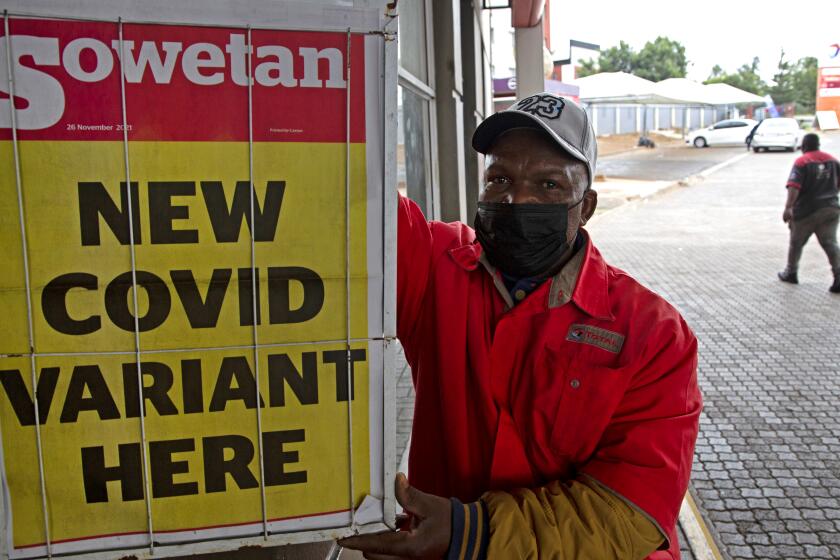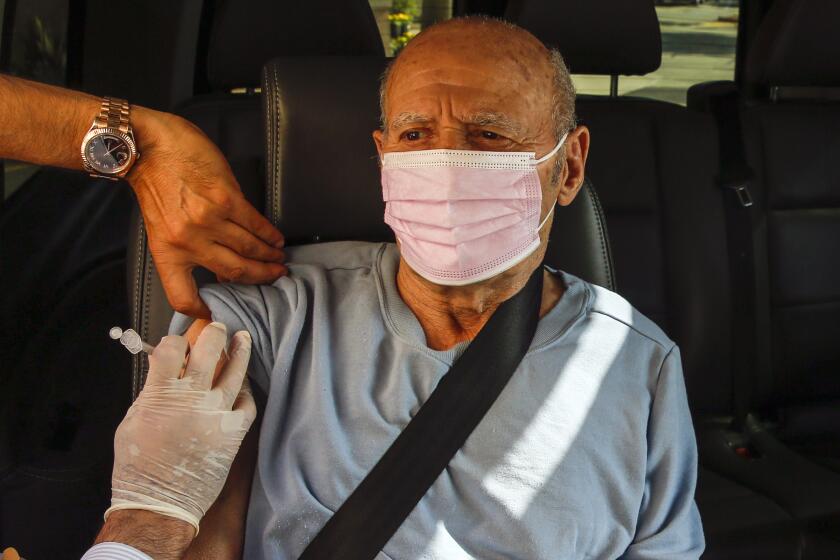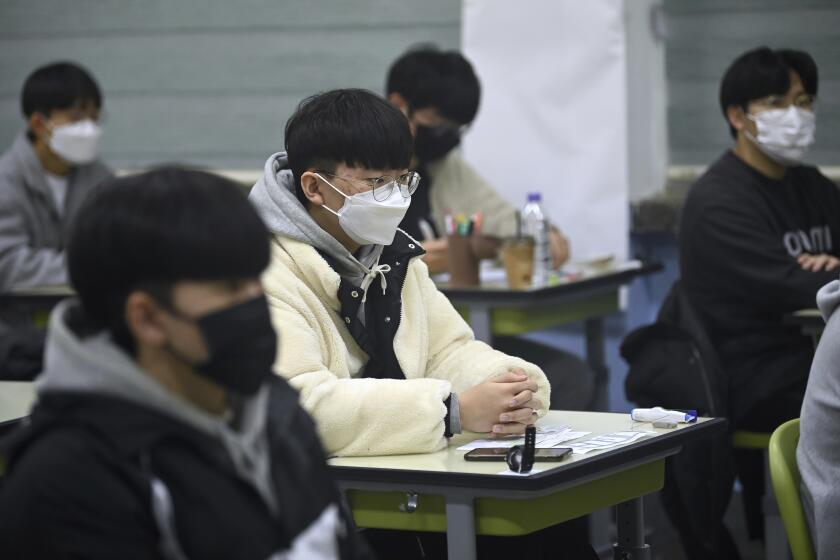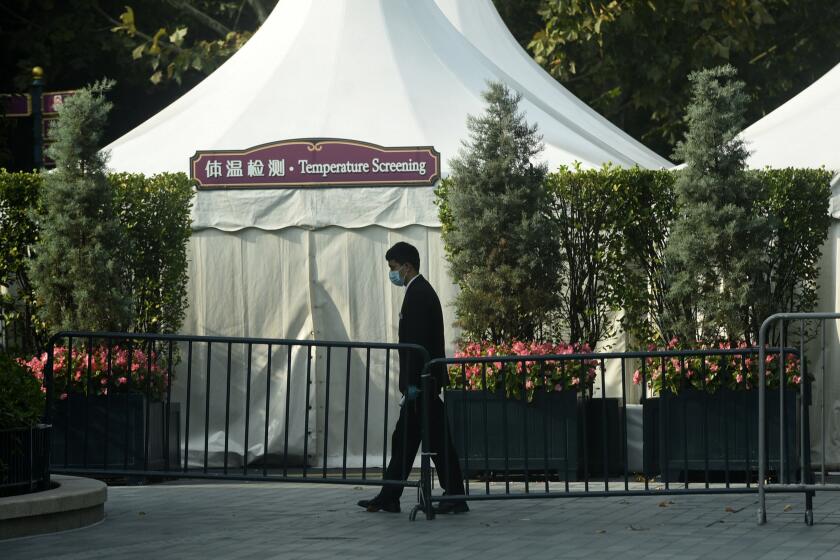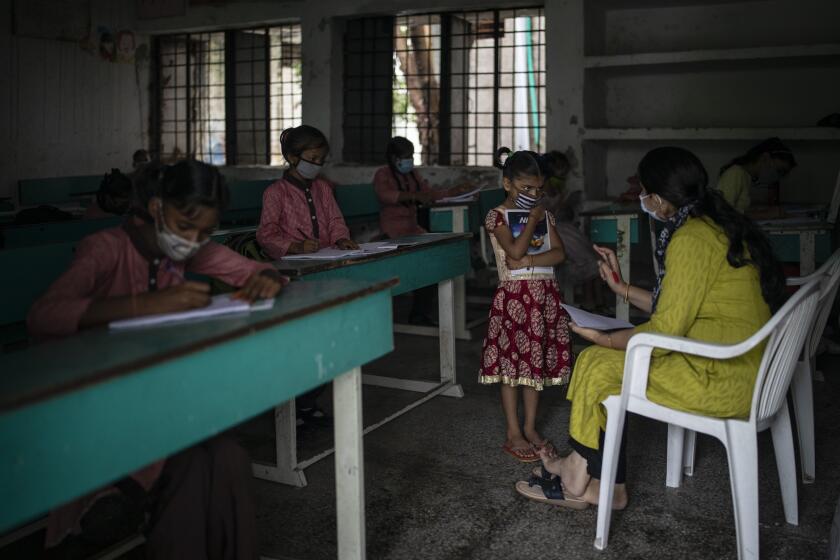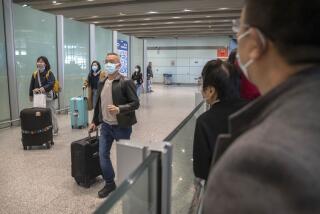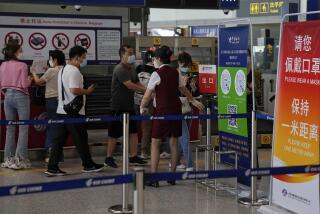Omicron variant of coronavirus casts a shadow over Asia’s cautious reopening
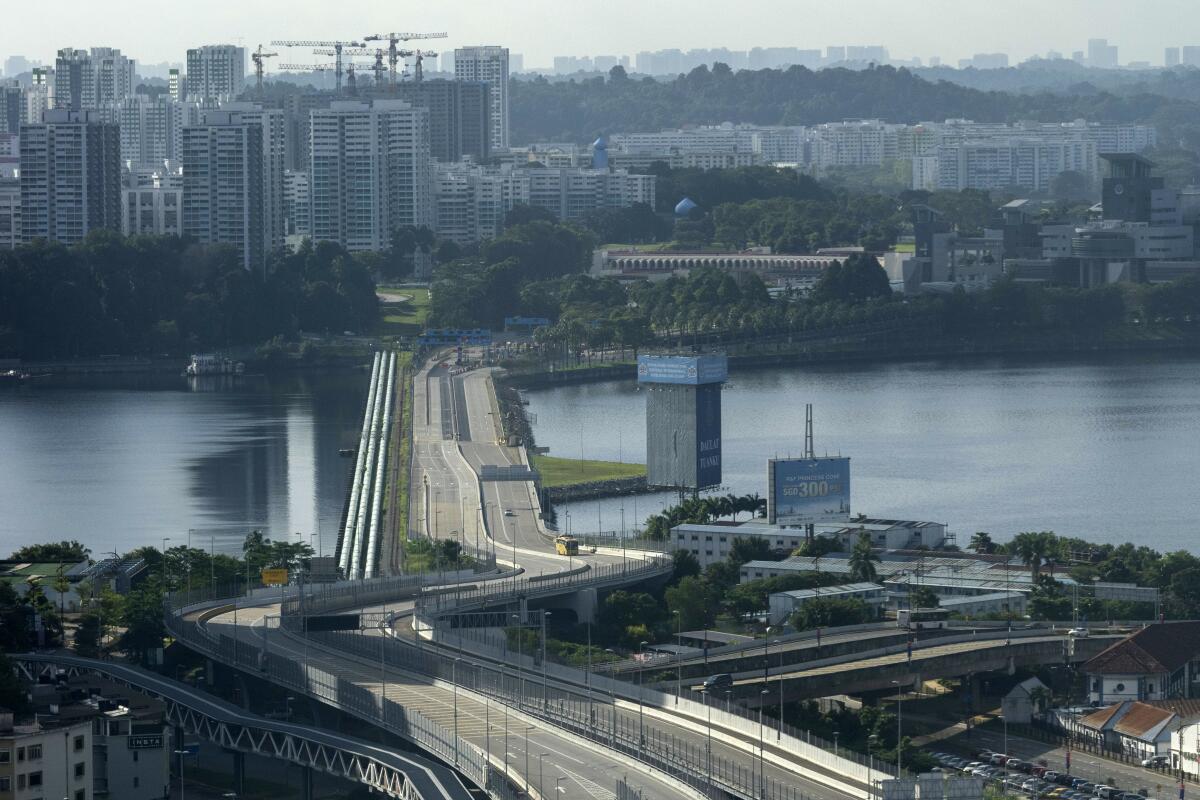
- Share via
SINGAPORE — The air-conditioned buses lumbered out of Singapore shortly after sunrise Monday carrying travelers into Malaysia for the first time in 21 months, modestly reviving what had been one of the world’s busiest border crossings before the pandemic.
The launch of the link Monday marked another major step in Singapore’s reopening and its bid to “live with COVID-19” — but it came amid sudden and growing concerns that the Omicron variant could stall the region’s recovery.
Singapore, like most of Asia, has been far more cautious than the West when it comes to relaxing border controls and loosening social restrictions. You won’t find crowded concerts and packed sports stadiums here. It’s virtually impossible to spot anyone flouting mask requirements. The spread of a more infectious new variant would almost certainly trigger the return of measures that could cancel travel agreements such as the one with Malaysia.
“We must be prepared for more bumps along the road,” Singaporean Prime Minister Lee Hsien Loong warned at a political convention Sunday. “We are not sure yet, but we may be forced to take a few steps back before we can take more steps forward.”
Countries across the world, including Singapore, are already sealing their borders to travelers from South Africa, where Omicron was first detected, and other countries where the variant has spread. Japan on Monday joined Israel as the only two nations to ban entry to all foreigners. The Philippines postponed a program that would have allowed some vaccinated foreign visitors, and Australia and India said they would review plans to ease border restrictions.
Cases of the variant, which display early signs of greater resistance to immunity generated from infections or vaccines, have been discovered in Australia, Austria, Belgium, Botswana, Britain, Canada, Denmark, France, Germany, Hong Kong, Israel, Italy and the Netherlands. Portugal announced Monday that 13 Omicron cases were detected among members of a local soccer team. No cases have been confirmed in the United States yet.
How you can protect yourself amid Omicron variant alarms: Here’s what we know.
U.S. health officials said it would take two weeks for scientists to determine the threat level of the Omicron variant. The danger could be compounded by the arrival of winter, when people spend more time indoors, giving the virus more opportunity to spread.
The specter of new lockdowns and travel restrictions rattled stock markets in Asia on Monday as investors tried to assess the impact of the emerging variant on a continent that generates 40% of the world’s GDP.
Japan, which had begun allowing limited entry for foreigners Nov. 8, announced that it would reverse those measures and stop admitting newly arriving foreign nationals starting Tuesday, citing the variant. (Foreigners with previously issued visas can still return to Japan.) The country had maintained stringent border controls throughout most of the pandemic and has recently seen infections plummet to about 100 a day, down from a peak of more than 25,000 in August.
Japanese Prime Minister Fumio Kishida said the move was aimed at preventing “the worst-case scenario,” calling it only “a temporary measure” until more is known about the new variant. He said Japan was analyzing the case of an arrival from Namibia who tested positive for COVID-19 to find out if the traveler was infected with the Omicron variant.
Officials warn of new winter COVID-19 wave with new ‘highly transmissible’ variant.
The blanket ban comes just three weeks after Japan had started issuing a limited number of short-term visas for students, business travelers and work trainees while keeping tourists out. Officials had been discussing allowing in strictly monitored and controlled group tours, measures that will probably be shelved as the border restrictions tighten.
Japan started requiring special quarantine and testing for arrivals from certain African nations over the weekend.
South Korea was also quick to ban entry to foreigners from eight African countries, including South Africa, Botswana and Zimbabwe. The country said migrant workers entering the country would be further scrutinized for travel to the region. Despite a high vaccination rate of about 80%, South Korea has recently seen some of its highest levels of infections since the beginning of the pandemic, fueled predominantly by the spread of the Delta variant after the country relaxed restrictions on social gatherings Nov. 1.
South Korea never closed its borders during the pandemic, but has instead relied upon strict quarantines for those arriving from overseas.
South Korea reports its biggest daily jump in coronavirus cases as hundreds of thousands of students take the high-pressure college entrance exam.
Asia’s largest country and economy, China, hasn’t announced any immediate changes because of the Omicron variant — mostly because its zero-COVID strategy already imposes some of the tightest entry restrictions in the world.
Travel to China from southern Africa has been strictly controlled. Those who had residence permits or visas prior to the pandemic have not been able to enter on them since March 2020. Only diplomats and a small number of individuals entering for work or family reunion have been able to acquire new entry visas from abroad on a case-by-case basis.
Getting a visa is only half the battle. Entry into China requires a series of stringent steps that include self-isolating for two weeks before boarding a plane and at least two weeks of quarantine upon arrival — three if you’re going to Beijing or returning to a university campus.
The approach has been criticized by some for being draconian, but if Omicron explodes into a crippling outbreak worldwide, Chinese policymakers will probably feel emboldened to double down.
Shanghai Disneyland will remain closed Monday and Tuesday because a single visitor over the weekend was later found to have COVID-19.
“China’s current strategy of rapid response and zero-COVID can take on all kinds of coronavirus variants,” Zhang Wenhong, a prominent doctor in charge of COVID response in Shanghai, wrote on Weibo. “We can handle Delta, and can also handle Omicron.”
The same can’t be said for other countries in the region. India, Indonesia, the Philippines, Malaysia and Thailand have each struggled to contain the coronavirus and can ill-afford a COVID-19 resurgence given the fragility of their economic recoveries and mostly low vaccination rates. And while Vietnam, Cambodia and Taiwan have handled the pandemic relatively well, none is looking to be tested again.
Singapore, as it often does, stands out as an anomaly given its diminutive size and deep pockets. Eighty-five percent of its 5.4 million residents are fully inoculated. The city-state’s opening up and tolerance for some level of infection and death are being watched closely as a counterpoint to Hong Kong, its longtime corporate and financial rival, which must adhere to China’s zero-COVID strategy.
Until the government introduced so-called Vaccinated Travel Lanes with a handful of countries starting in September, Singaporeans faced expensive, two-week quarantines at designated hotels when returning from overseas. Now, many residents are flocking to Changi Airport, no longer confined to staycations and “cruises to nowhere.”
Education lifts many out of poverty in India, but COVID has closed schools. Now India is bracing for a surge in child labor and underage marriages.
Amanda Tan felt pangs of envy when a friend told her about a recent trip to Germany where she got to while away a day mask-free in a beer garden — a visit that took place before the German government imposed new restrictions this month to combat a rise in infections. Tan plans to let loose herself when she flies to London on Wednesday to enjoy a much-needed weeklong vacation, her first time abroad in more than two years.
“I just want to get out of Singapore for a little bit,” said Tan, 36, who works at an online marketing agency. “Singapore has been pretty strict with a lot of mandates, and they kept going back and forth with the rules.”
Tan said she’s packing industrial-grade face masks and rapid antigen test kits — necessary precautions for what could be her last chance to travel for some time if the Omicron variant proves as disastrous as the Delta variant. Also, Britain itself, leery over the new coronavirus strain, just announced that, starting Tuesday, it would start requiring PCR tests of all incoming travelers within 48 hours after arrival.
The emergence of Omicron casts a cloud over what should be a day of celebration for Singapore residents with Malaysia ties, said Emily Chiang, who owns a nail salon in the heart of Singapore’s main shopping district and hasn’t visited her ailing mother in Malaysia since her mom suffered a stroke a year ago.
Breaking News
Get breaking news, investigations, analysis and more signature journalism from the Los Angeles Times in your inbox.
You may occasionally receive promotional content from the Los Angeles Times.
“I’m very happy for my friends who get to travel home now,” said Chiang, 42, who is waiting until her peak business season is over after Chinese New Year in February to make the trip across one of the causeways connecting Singapore to Malaysia. “There are so many Malaysian families separated because parents have to stay in Singapore to earn money.”
The start of quarantine-free travel, which includes flights across the Johor Strait, reopens a lifeline for two countries that are inextricably linked economically and culturally. Chiang, however, can’t help but worry that the progress will be fleeting. If Omicron crashes into Singapore and overwhelms the nation’s hospitals, the government will again order businesses closed and residents indoors.
If that happens, she’ll have no chance of keeping her salon open, having already depleted her savings.
“I would not be able to survive,” said Chiang, who is urging her Malaysian employees to make trips home while they still can. “Even when I talk to my customers, I can tell everyone is stressed. They’re worried about the new virus. They don’t want to have to do this all over again.”
Pierson reported from Singapore, Kim from Seoul and Su from Beijing.
More to Read
Sign up for Essential California
The most important California stories and recommendations in your inbox every morning.
You may occasionally receive promotional content from the Los Angeles Times.
